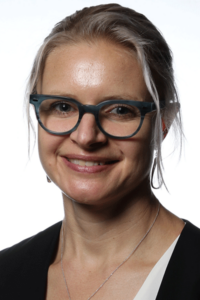A panel of four experts will discuss digital technologies, including ways that behavior change research is being used in diabetes technology, during the Scientific Sessions symposium The Diabetes Digital Landscape through a Psychosocial and Behavioral Lens, which will begin at 4:30 p.m. ET Monday, June 28.

Maureen Monaghan, PhD, CDCES, Associate Professor in Psychology and Behavioral Health, Children’s National Hospital and the George Washington University School of Medicine and Health Sciences, will discuss the use of behavior change techniques in diabetes technologies to increase opportunities for sustainable improvements in health. Unfortunately, she said, behavior change theories and techniques aren’t consistently utilized and applied in educating patients and promoting uptake and use of diabetes technologies.
“There are some key features of diabetes technologies that can be designed to incorporate behavior change,” Dr. Monaghan said. “Opportunities for education and skill development, individualized goal setting, a strong mechanism to receive feedback, and enhancing social support and social connections are four keys to enhance success with diabetes technology use.”
Diabetes care and support professionals have an important role to play, she said, in terms of educating patients on how to effectively and optimally use technology to improve their diabetes management.
“It’s important to understand that people aren’t necessarily going to change their behavior just to use a diabetes technology, so we have to be able to adapt diabetes technology to meet the needs they already have in their day-to-day lives,” Dr. Monaghan said. “That really puts the responsibility on health care providers to offer tailored education related to knowledge and skills needed to engage with diabetes technologies and devices, and help patients adapt their technology use to their lifestyle and preferences.”

Samantha Kleinberg, PhD, Associate Professor in the Computer Science Department, School of Engineering and Science, Stevens Institute of Technology, will review efforts to use blood glucose data to detect meal content and timing.
“My group has worked on automated dietary monitoring using body-worn sensors and we’ve shown that you can figure out not just when people are eating, but what people are eating in every single bite,” Dr. Kleinberg said. “This is particularly exciting from the perspective of an artificial pancreas because you could think about dosing insulin over time, accounting for fat, protein, and carbohydrates. You don’t have to wait until the end of the meal—you can figure it out as it’s happening, before it hits your bloodstream, and before glucose even rises.”
Among the challenges, she said, is that this level of monitoring requires patients to wear additional devices.
“Right now, it requires you to wear an earbud that captures audio, and you have to wear wristwatches that capture motion,” Dr. Kleinberg said. “We’re working on an all-in-one device, but it’s still something extra that you have to wear and, if you’re already wearing an insulin pump and a CGM (continuous glucose monitor), it’s a lot to ask to add on more devices.”

Jennifer Raymond, MD, MCR, Chief of the Division of Endocrinology, Children’s Hospital Los Angeles, and Associate Professor of Clinical Pediatrics, University of Southern California Keck School of Medicine, will examine the use of virtual diabetes care to address diabetes distress in young adults.
“Young adults with diabetes are the population with the highest A1C across the lifespan of diabetes. They also have longer gaps in follow-up care, meaning that they’re not always coming to appointments, and they have higher rates of DKA (diabetic ketoacidosis) and other diabetes complications,” Dr. Raymond said. “It’s a very important time to focus on because they experience some of the highest challenges when it comes to managing their diabetes.”
Young adults, she said, can also experience higher levels of diabetes distress, the negative emotions that can come from living with and managing their disease.
“Those negative emotions can include frustration, hopelessness, anger, guilt—all of those things—as well as feelings of worrying about your care or feeling unsupported or disappointing to family or care providers,” Dr. Raymond said. “Obviously, we don’t want anyone to feel that way, and diabetes distress has been associated with poorer diabetes management and higher hemoglobin A1C.”
Also presenting during the symposium, Shelagh A. Mulvaney, PhD, Associate Professor of Nursing, Biomedical Informatics, and Pediatrics, Vanderbilt University, will discuss the integration of psychosocial factors in diabetes research and care.
VIEW THIS PRESENTATION
Already registered?
View this presentation at ADA2021.org
Not yet registered?
Register now to access all presentations from the Virtual 81st Scientific Sessions